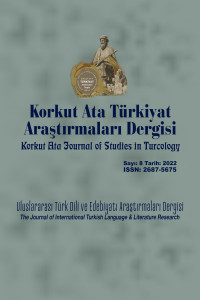Commentary on Nef’i’s Sahba-name
Abstract
Divan literature lived its golden age in the 16th century with great poets such as Fuzulî, Baki, Ahmed Pasha, Necati and Zâtî. It continued the same success in the next century with master poets such as Sheikh Galib, Nâ’ilî and Nef’î. By the 17th century, divan literature had significantly completed its development. Nef’î had been one of the important cornerstones of classical literature with the poems he wrote in this century. The poet influenced the poets who wrote odes both in his own time and in the centuries after him. Nef’î is considered to be the master of satire of his time. In his poems, an artistic style interwined with rich music, thought and knowledge is observed. The subject of the commentary is Terkib-bend as "Sakiname". However, considering the content of the poem, it is more appropriate to call it "Sahbaname". The poet highlighted the strengths of wine by counting the characteristics of wine throughout the poem. He tried to prove the superiority of wine by comparing it with other pleasure substances. In this study, the translation and intralinguistic translation of Nef’î’s five clause composition-i clause known as Sahbaname has been made. The poem has been annotated couple by couplet. In addition, poetry has been examined in terms of prosody and harmony elements.
Keywords
References
- Akkuş, M. (2018). Nefi Divanı. Ankara: T.C. Kültür ve Turizm Bakanlığı Kütüphaneler ve Yayımlar Genel Müdürlüğü. https://ekitap.ktb.gov.tr/Eklenti/57741,nefi-divanipdf.pdf?0 [Erişim tarihi: 28.03.2022].
- Alıcı, L. (2008). Klasik Türk Şiirinde Muhabbet Kanunları. Türk Kültürü İncelemeleri Dergisi, 9(19), 119-142.
- Aşcı, G. (2019). Sâkînâmelere Göre Şarabın Vasıfları ve Etkileri. Journal of Turkish Language and Literature, 5(2), 145-178.
- Cengiz, E. (2006). Nef’î Divânı’nda Gazellerin Söz Âhengi. Yüksek Lisans Tezi. Kahramanmaraş: Kahramanmaraş Sütçü İmam Üniversitesi.
- Gümüş, M. Y. ve Mum, C. (2018). Klasik Türk Şiirinde Rint ve Şarap İlişkisi. Birey ve Toplum, 8(16), 109-138.
- Kurnaz, C. (2001). Eski Türk Edebiyatı. İstanbul: Bilge Kültür Sanat Yayınları.
- Kut, G. (2017). Kadın Şairlerden Mihrî, Şeref ve Leylâ Hanım Gazellerinde “Bezm”. Amasya Üniversitesi Sosyal Bilimler Dergisi, 1(2), 175-186.
- Kuzu, F. (2014). Klâsik Şiirde Şarap Kavramı ve Fehîm-i Kadîm’in “Şarâb” Redifli Gazeli Üzerine Bir Tahlil Denemesi. Gaziantep University Journal of Social Scienes, 13(4), 961-972.
- Levend, A. S. (2021). Divan Edebiyatı Kelimeler ve Remizler Mazmunlar ve Mefhumlar. İstanbul: Dergâh Yayınları.
- Mir’at kavramı. http://lugatim.com [Erişim tarihi: 03.06.2022].
- Nef’i. https://islamansiklopedisi.org.tr, [Erişim tarihi: 03.06.2022].
- Onay, A. T. (1993). Eski Türk Edebiyatında Mazmunlar ve İzahı. Ankara: TDV Yayınları.
- Öztürk, G. (2016). Nef’i Divanı’ndaki Mitolojik ve Efsanevi Şahıslar. Yüksek Lisans Tezi. Gaziantep: Gaziantep Üniversitesi.
- Pala, İ. (2020). Ansiklopedik Divan Şiiri Sözlüğü. İstanbul: Kapı Yayınları.
- Uludağ, S. (2012). Tasavvuf Terimleri Sözlüğü. İstanbul: Kabalcı Yayıncılık.
Nef’î’nin Sahbâ-nâmesinin Şerhi
Abstract
Divan edebiyatı, 16. yüzyılda Fuzûlî, Bakî, Ahmed Paşa, Necâtî ve Zâtî gibi büyük şairlerle altın çağını yaşamıştır. Aynı başarıyı sonraki yüzyılda da Şeyh Gâlib, Nâ’ilî, Nef’î gibi usta şairlerle devam ettirmiştir. 17. yüzyıla gelindiğinde divan edebiyatı gelişimini önemli ölçüde tamamlamıştır. Nef’î, bu yüzyılda yazdığı şiirlerle klasik edebiyatın bayrağını taşıyan önemli köşe taşlarından biri olmuştur. Şair gerek kendi zamanında gerekse kendinden sonraki asırlarda kaside yazan şairleri etkilemiştir. Nef’î, yaşadığı dönemin hiciv üstadı olarak kabul edilir. Şiirlerinde zengin bir musiki, düşünce ve bilgiyle yoğrulmuş sanatlı bir üslup gözlenir. Şerhe konu olan terkib-bend birçok kaynakta “Sâkî-nâme” olarak geçer. Ancak şiirin içeriğine bakıldığında “Sahbâ-nâme” olarak adlandırılmasının daha uygun olacağı değerlendirilmiştir. Şair, şiir boyunca şarabın özelliklerini sayarak onun güçlü yönlerini öne çıkarmıştır. Onu diğer keyif verici maddelerle de karşılaştırarak şarabın üstünlüğünü ispatlama çabasına girişmiştir. Bu çalışmada Nef’î’nin Sahbâ-nâme adıyla bilinen beş bentlik terkib-bendinin çeviri yazısı ve dil içi çevirisi yapılmıştır. Şiir beyit beyit şerh edilmiştir. Ayrıca şiir, vezin ve ahenk unsurları bakımından da incelenmiştir.
Keywords
References
- Akkuş, M. (2018). Nefi Divanı. Ankara: T.C. Kültür ve Turizm Bakanlığı Kütüphaneler ve Yayımlar Genel Müdürlüğü. https://ekitap.ktb.gov.tr/Eklenti/57741,nefi-divanipdf.pdf?0 [Erişim tarihi: 28.03.2022].
- Alıcı, L. (2008). Klasik Türk Şiirinde Muhabbet Kanunları. Türk Kültürü İncelemeleri Dergisi, 9(19), 119-142.
- Aşcı, G. (2019). Sâkînâmelere Göre Şarabın Vasıfları ve Etkileri. Journal of Turkish Language and Literature, 5(2), 145-178.
- Cengiz, E. (2006). Nef’î Divânı’nda Gazellerin Söz Âhengi. Yüksek Lisans Tezi. Kahramanmaraş: Kahramanmaraş Sütçü İmam Üniversitesi.
- Gümüş, M. Y. ve Mum, C. (2018). Klasik Türk Şiirinde Rint ve Şarap İlişkisi. Birey ve Toplum, 8(16), 109-138.
- Kurnaz, C. (2001). Eski Türk Edebiyatı. İstanbul: Bilge Kültür Sanat Yayınları.
- Kut, G. (2017). Kadın Şairlerden Mihrî, Şeref ve Leylâ Hanım Gazellerinde “Bezm”. Amasya Üniversitesi Sosyal Bilimler Dergisi, 1(2), 175-186.
- Kuzu, F. (2014). Klâsik Şiirde Şarap Kavramı ve Fehîm-i Kadîm’in “Şarâb” Redifli Gazeli Üzerine Bir Tahlil Denemesi. Gaziantep University Journal of Social Scienes, 13(4), 961-972.
- Levend, A. S. (2021). Divan Edebiyatı Kelimeler ve Remizler Mazmunlar ve Mefhumlar. İstanbul: Dergâh Yayınları.
- Mir’at kavramı. http://lugatim.com [Erişim tarihi: 03.06.2022].
- Nef’i. https://islamansiklopedisi.org.tr, [Erişim tarihi: 03.06.2022].
- Onay, A. T. (1993). Eski Türk Edebiyatında Mazmunlar ve İzahı. Ankara: TDV Yayınları.
- Öztürk, G. (2016). Nef’i Divanı’ndaki Mitolojik ve Efsanevi Şahıslar. Yüksek Lisans Tezi. Gaziantep: Gaziantep Üniversitesi.
- Pala, İ. (2020). Ansiklopedik Divan Şiiri Sözlüğü. İstanbul: Kapı Yayınları.
- Uludağ, S. (2012). Tasavvuf Terimleri Sözlüğü. İstanbul: Kabalcı Yayıncılık.
Details
| Primary Language | Turkish |
|---|---|
| Subjects | Literary Studies |
| Journal Section | Araştırma Makaleleri |
| Authors | |
| Publication Date | August 30, 2022 |
| Submission Date | June 22, 2022 |
| Published in Issue | Year 2022 Issue: 8 |

